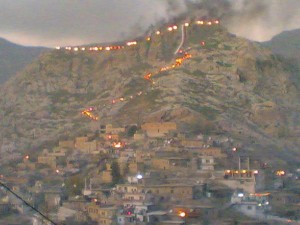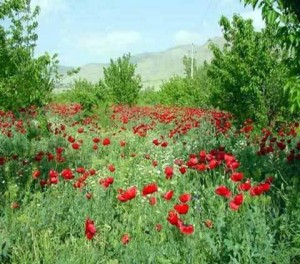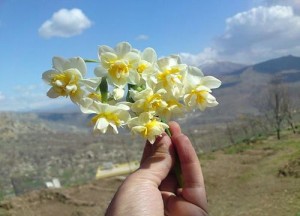 If you think your spring traditions go back a few generations, or even to the birth of your nation, consider Newroz (New Day), one of the oldest celebrations in history. It all began in an unlikely place, and remains to this day an occasion celebrated by millions with joyful anticipation. Every once in a while, it is good to pause and celebrate that which can teach us all something, and learn that balance comes from understanding more about cultures before passing judgements.
If you think your spring traditions go back a few generations, or even to the birth of your nation, consider Newroz (New Day), one of the oldest celebrations in history. It all began in an unlikely place, and remains to this day an occasion celebrated by millions with joyful anticipation. Every once in a while, it is good to pause and celebrate that which can teach us all something, and learn that balance comes from understanding more about cultures before passing judgements.
It all began back in 612 BC. Kawe, a Kurdish blacksmith, decided he was fed up with the tyranny of Zehak, an evil king who represented cruelty, abuse, injustice and enslavement of the people. On March 21st, Kawe led a popular uprising and surrounded Zehak’s Palace. After rushing past the palace guards, Kawe succeeded in finding Zehak, grabbed him around the neck and hit him over the head with a hammer. After dragging the defeated king off his throne, Kawe declared freedom throughout the land and ordered fires to be set on the tops of the mountains to let all the people know and to offer thanks to God for helping free the people from Zehak.
 “This is where the tradition of Newroz fire festival originates. Today, Newroz is not just a day for remembering, it is also a day for protest and resistance against oppression, injustice, backwardness and barbarity…,” writes Dr. Afrasiab Shekofteh. “Newroz also signifies the celebrations of Spring and natural outgrowth of the earth rhythms. In most of the Silk Road countries, Newroz announces the joyful awakening of the agricultural cycle of cultivating, planting and harvesting.”
“This is where the tradition of Newroz fire festival originates. Today, Newroz is not just a day for remembering, it is also a day for protest and resistance against oppression, injustice, backwardness and barbarity…,” writes Dr. Afrasiab Shekofteh. “Newroz also signifies the celebrations of Spring and natural outgrowth of the earth rhythms. In most of the Silk Road countries, Newroz announces the joyful awakening of the agricultural cycle of cultivating, planting and harvesting.”
There are many traditions surrounding the celebration of Newroz; from a table set with mirrors, candles, a vase with red fish swimming around, incense, and a sacred book; to the giving of spring flowers. It inspires one to look within as well as around in the advent of spring. For the 13 days following Newroz, it is said that the next year will be determined by what is done during this window of time. Many people reconcile differences with others, reunite with friends and extend forgiveness to others. While traditional spring house cleaning is done in their homes, they clean old grudges from within.
Perhaps you are wondering why this should all matter. A Kurdish holiday from 612 BC being discussed in 2014 might seem “antiquated” to you. What is important here is to note that during our discussion of the Kurdish people, we have pointed out that these 30-35 million people are the largest ethnic population in the world with no country. They were oppressed in 612 BC; they are even more oppressed now. From the Anfal campaigns to the Syrian crisis and involving turmoil in Turkey, Iraq and Iran – the Kurdish people have struggled through oppression and persecutions for centuries.
Yet these people celebrate life. They sing, they dance, they honor their past and long for a peaceful future. They dream of a life where they can speak their own language and live in peace with their neighbors. It doesn’t seem that they are asking that much, does it?
What preconceived prejudices and grudges can you discard this spring?

